October 2020: Olive Tree

Volume V/Issue 7/October 2020


From The Editorial Desk
The Lord Is Great and Does Wondrous Things
There is none like you among the gods, O Lord, nor are there any works like yours. All the nations you have made shall come and worship before you, O Lord, and shall glorify your name. For you are great and do wondrous things; you alone are God. Psalm 86:8–10
The text has three verses 8, 9, and 10. Verse 10 says, "For you are great and do wondrous things; you alone are God." Notice it is given as a reason ("For you are great . . . "). When you say, "I bought a bagel, for I was hungry," you mean that your hunger was the reason you bought the bagel. So when David says, "For you are great and do wondrous things," he means that God's greatness is the reason for verse 9—that "All the nations you have made shall come and worship before you, O Lord, and shall glorify " And his greatness is the reason for verse 8 too—that there is none like him among the gods, nor any works like his. In other words, God's greatness makes him stronger than all the gods of the universe and God's greatness makes him stronger than all the nations of the world. He rules the gods and he rules the nations, FOR (because) he is great and does wondrous things; he alone is God. God over all gods and God over all nations.
The Greatness of God Is Central to All Life
Mary, our mother, is pursaded that God is great. God is very great, and his greatness is unsearchable. Mary, I am sure, believe that this was central to all of life. This was relevant to everything She thought and felt and did in life. The unparalleled, incomparable, unequaled, unrivaled greatness of God was utterly important in the vocation she was called to and that she answered yes to. The greatness of the Lord was always central to Mary “proclaiming the greatness of the Lord,” (Luke 1:6) I am sure that she believes that, even when people don't know it, what they need most and are most starved for is a vision of an awesomely great God, and fellowship with an infinitely great God.
The Greatness of God Is Utterly Relevant
It is utterly relevant for everything in life.
-
If we saw the greatness of God, we would not be so greedy and covetous.
-
If we saw the greatness of God, our eyes wouldn't stray after lustful images and thoughts.
-
If we saw the greatness of God, we wouldn't get angry at our children so easily.
-
If we saw the greatness of God, we wouldn't pout and get hurt so easily in our marriages.
-
If we saw the greatness of God, we wouldn't worry about our looks so much.
-
If we saw the greatness of God, we wouldn't spend time watching mindless and sordid and defiling television programs.
-
If we saw the greatness of God, we wouldn't get so discouraged with the evil and godlessness of our culture.
-
If we saw the greatness of God, we wouldn't give in to our appetites and overeat in boredom and depression.
And there are a hundred other unforeseen good effects that would come into our lives if we could keep the greatness of God in the front of our minds and be gripped by his awesome reality. In other words, just like the Bible says in 2 Corinthians 3:18, if we saw the greatness of God—the glory of God—we would be changed from one degree of glory to the next.
Have You Seen the Greatness of God?
What your neighborhood needs more than anything else from you is to see the glory of God. And don't think that your smallness is an obstacle to that. A telescope is a very small instrument, but it helps people see fantastic realities in the sky. God loves to magnify his greatness by shining through vessels of clay. "My power is made perfect in weakness," Jesus said. The issue is not smallness. The issue is: have you seen the greatness of God? Have you been taken captive as it were by the glory of his power and knowledge and love, in such a way that all human power and all human knowledge and all human love lose the power of their attraction? That's the issue of your impact in your neighborhood and even in your parish. Have you seen the greatness of God?
As Mary has always been about “proclaiming the greatness of the Lord,” it is apropos that during the month of October, through her Rosary, we go deeper into the great mysteries of the life of the Son of God who humbled himself by becoming one of us so as to bless us with eternal life and save us from an ignominious death.
Progressively, over a period of possibly one thousand years, the fullness of the devotion to the Holy Rosary was not fully revealed to the world until 1917 when Our Lady stated, I am "Our Lady of the Rosary." If we are to measure the progressive honors that the Blessed Virgin Mary has received since she has departed from this world, can we begin to imagine what honors awaits her in the days to come?
Today, let us reflect upon the mystery of Our Lady of the Rosary that is unraveling itself upon the world. But let us also not to forget to reflect on her heart felt proclamation when she said “My soul proclaims the GREATNESS of the Lord, and my spirit rejoices in God my Saviour”
The Second Conversion
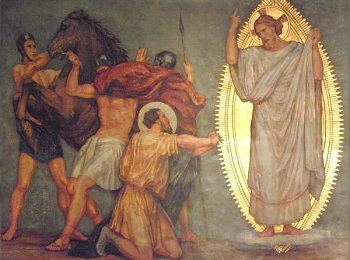
Those of us baptized as infants have what the spiritual authors call a second conversion. When we reach the age of reason, we can now choose between good and evil. Some day we must choose good in order to go home eventually to heaven. This choice is called a conversion, because it is the same choice an adult makes, when they choose to come to the Church and follow the teachings of the Gospel.
If we do not choose good, then we will choose evil and begin a life of sin, beginning with little venial sins. Although we are choosing evil, we are also studying the Catechism and hearing sermons that tell us to choose good. In the Catechism we learn of the evil of sin and that it has grades, mortal and venial. We learn that one unrepented mortal sin is a ticket to hell, whereas a million venial sins will only earn Purgatory. And this is where we make a big mistake.
Sin is a poison to our soul. Mortal sin is a fast acting poison, which kills off grace at once. Venial sin is a slow poison that weakens our soul. Wisdom tells us: "he that contemneth small things, shall fall by little and little." (Ecclesiasticus 19:1) Slowly we slide down the slippery slope until that first mortal sin entices us. We may resist it, but eventually we find a sin that is just too tempting, and then we commit our first mortal sin. The second is easier than the first. If we are still assisting at Mass weekly, we may begin the habit of confessing every time we commit a mortal sin. We soon forget, that an essential part of the Sacrament of Penance is a firm purpose of amendment, which we do not have. The sin we confess Saturday afternoon we may have already made plans on getting into the near occasion of that very sin next Friday night.
Eventually we are in the habit of committing sin, confessing, then returning to the same sin over and over again. We are definitely in need of conversion. If we don't convert, we will perish as Scripture says: "No, I say to you: but unless you shall repent, you shall all likewise perish." (Luke 13:3,5) Pope Pius IX, who read the Secret of La Salette was asked what it contained and he quoted this Scripture and told those questioning that this is all they needed to know. Indeed, this is what we all need to know.
Before our real conversion, we may be proud of being practicing Catholics. We are faithful to Sunday Mass. We faithfully contribute to the work of the Church, but we will be ready to proudly brag that we gave half of the extra pay we got from that last day of over time. We are proud to be Catholic, when Catholicism is a religion of humility.
Shortly after Pentecost, Peter told a crowd: "Be penitent, therefore, and be converted, that your sins may be blotted out." (Acts 3:19) There are two types of saints. The first, like Saint Therese of Lisieux, never commit a mortal sin. Yes they need conversion, if they were baptized as infants. The second and far larger class are penitents. A penitent is a person who has committed one or more mortal sins and leaves his life of sin for a life of virtue. Father Mateo, founder of the movement of Enthronement of the Sacred Heart last century, tells us that eighty-five percent of the Saints were penitents. Saint John Vianney tells us: "The saints did not all begin well; but they all ended well." Conversion is the beginning of ending well.
"And Jesus calling unto him a little child, set him in the midst of them, and said: Amen I say to you, unless you be converted, and become as little children, you shall not enter into the kingdom of heaven. Whosoever therefore shall humble himself as this little child, he is the greater in the kingdom of heaven." (Matthew 18:2-4) Conversions means a return to spiritual childhood. Consider how trusting a child is of his father. We must be just that trusting in God the Father.
Conversion, according to the Fathers of the Church is a complete change of customs and habits. We change from lax Catholicism, which is on the edge of mortal sin, to a life of virtue. When we convert, we will find things that must be removed from our lives. This may even require spiritual surgery. "And I will give you a new heart, and put a new spirit within you: and I will take away the stony heart out of your flesh, and will give you a heart of flesh." (Ezechiel 36:26) Yes we have had spiritual heart disease and God may have to do surgery to remove our hardened heart and replace it with a new heart; a heart docile to Almighty God.
We are changing a barn full of manure (sin) into a church full of grace. What we must realize is that our life has been a mistake, because we have compromised with sin, making our pet sin an essential part of life. It is this compromise with sin that must end. Sin must no longer be a part of our lives.
The Council of Trent tells us that to prepare for death, the whole life of a Christian ought to be a perpetual repentance. Self-denial is an essential part of repentance, because it is selfishness that underlies our sins. Sin is selfishness in action. Self-indulgence blocks grace in our lives. Mortification is the enemy of self-indulgence. By mortification we regulate our lives in a proper manner, putting self last where it belongs, seeking God first. Saint Paul says: "For if you live according to the flesh, you shall die: but if by the Spirit you mortify the deeds of the flesh, you shall live." (Romans 8:13)
John the Baptist said: "Do penance: for the kingdom of heaven is at hand." (Matthew 3:2) A footnote in the Bible says: "Penance: Which word, according to the use of the scriptures and the holy fathers, does not only signify repentance and amendment of life, but also punishing past sins by fasting, and such like penitential exercises." Our biggest problem here is that we attempt to cover our sins by acts of penance without any true repentance. Look at the publican in Scripture: "O God, I give thee thanks that I am not as the rest of men, extortioners, unjust, adulterers, as also is this publican. I fast twice in a week: I give tithes of all that I possess." (Luke 18:11-12) How many of us say a daily Rosary, abstain from meat on Fridays and observe the fast laws of the Church and yet are unconverted? Penance without repentance is worthless. What did Jesus say of the Publican? "I say to you, this man (the publican) went down into his house justified rather than the other (pharisee): because every one that exalteth himself, shall be humbled: and he that humbleth himself, shall be exalted." (Luke 18:14)
Let us conclude with some thoughts. First of all, sin is the only evil in the world and must be completely removed from our lives. Secondly venial sin leads to mortal sin. "he that contemneth small things, shall fall by little and little." (Ecclesiasticus 19:1) Therefore we must also remove all habits of sin, mortal and venial from our lives. This is the penance we begin with. All other penances are undertaken in order to aid us in accomplishing our goal as Jesus told two different people: "Go now and sin no more."
Holy Mass is Thanksgiving

The holy gospel for the 13th Sunday after Pentecost talks about the healing of ten lepers but among the the ten healed only one returned back to give thanks and praise. It was a samaritan.
"There were ten who were healed; Where are the other nine?" "why is this foreigner the only one who came back to give thanks to God?" asked the Lord. ( Luke 17:17-18).
Gratitude is the best attitude. However, this attitude seem to be forgotten. Many seem tobe ungrateful. Perhaps many are so focused on their problems not on their blessings.
There are six things we should be thankful for :
1. This moment. It will not come back anymore.
2. Health. If you're healthy then you're wealthy since health is wealth.
3. Alive. Thank God you are still alive. Who knows when are we still here? we are not sure of tomorrow.
4. Number of trials. Let us be grateful for our problems. Because our problems now can be our blessings tomorrow.
5. Kind people. Persons are gifts. Thank God for your love ones and friends.
6. Sacrifice of the Holy Mass. At Mass we are assured of God's presence. At Mass we received Jesus Christ. Another name for the Mass is Eucharist which means Thanksgiving. When we offer the Mass, we offer thanksgiving to the Lord. But nowadays, Attendance at Holy Mass is decreasing. Does it mean Lord is not anymore relevant today? Does man focus much on problems than on God ?
Gratitude is the best attitude. Consider God than your troubles and you will be happy.
God has two homes:
one in heaven.
Two in thankful heart.
The Funny Pharmacy
A joyful mind maketh age flourishing: a sorrowful spirit drieth up the bones. - Proverbs 17:22


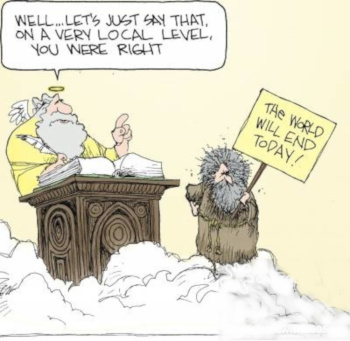

Frequently Asked Questions

Which Missal Should We Use?
The Missal was revised after the Council of Trent and issued in 1570 by Pope Saint Pius V with the Bull, Quo Primum. The calendar was also revised at that time. Throughout the centuries the calendar has been revised. Saint Pius X revised the calendar and breviary in 1911 with the decree Divino Afflatu. Pope Pius XII revised the calendar in 1955 and the Rite of Holy Week in the same year. Anti-pope John XXIII revised the calendar in 1960 with the decree Rubricarum Instructum.
Saint Pius X revised both the Breviary and the calendar in 1911 and imposed the revision in 1913. One of the main revisions concerned the Mass and Office of Sundays. Sundays are classed as semi-doubles, which means that the antiphon at Matins, Lauds and Vespers are introduced before the Psalm with a few words, then recited fully after the Psalm. Feasts of Saints have several classes from Double of the First Class down to Simple. These classes are used to determine which Mass and Office are recited on a Sunday, if the feast of a saint occurs on Sunday. Doubles of whatever kind out rank semi-doubles, which meant often the Sunday Mass and Office were supplanted by the feasts of most saints throughout the year. Saint Pius X provided that Sundays, although only semi-doubles, out rank all but the most important feasts of the year, so that the Sunday Mass and Office are recited and the Gospel and Epistles are read in the Mass for the Faithful. His decree provides: "in the sacred liturgy those most ancient Masses of the Sundays during the year and of the ferias, especially those of Lent, recover their rightful place."
Saint Pius X's decree also provides: "it will be clear to everybody that by what we have here decreed we have taken the first step to the emendation of the Roman breviary and the missal, but for this we shall appoint shortly a special council or commission." And so Pope Saint Pius X envisioned a further revision in the future. We see this in the revision of 1955 under Pope Pius XII. Pope Pius XII simplified the calendar, removing the rank of semi-double, reducing those fests (except Sundays) to simples. He also removed all but three octaves. His revision also envisioned a revision in the near future.
Pius XII states: "Whereas priests today, especially those who have the care of souls, are burdened with various new apostolic duties, so that they can scarcely recite the divine Office with the tranquility of mind which it requires, some local Ordinaries have earnestly petitioned the Holy See that some provision be graciously made to meet this difficulty, and at least that the copious apparatus of the Rubrics be reduced to a simpler form."
When Pope Pius XI instituted the Feast of Christ the King, he wrote: "For people are instructed in the truths of faith, and brought to appreciate the inner joys of religion far more effectually by the annual celebration of our sacred mysteries than by any official pronouncement of the teaching of the Church." By the time of Pope Pius XII, octaves were only observed by the clergy who recite the Divine Office. The faithful did not observe the octaves as they had been observed centuries ago. Unfortunately by this time, even the institution of feasts did not have much effect on the hearts of the people. The institution of the Feast of Saint Joseph the Workman to counteract Communist May Day on May first did not have the desired effect on the hearts of men.
Considering that Pope Pius XII was the last Pope prior to Pope Michael, in holy obedience, those who accept him as Pope are duty bound to accept the calendar revision of 1955.
For answers to more frequently asked questions, click here: https://www.vaticaninexile.com/frequently_asked_questions.php
The Pope Speaks: October 2020
How to Prepare For a Time of Persecution And Turmoil

In times of ease and comfort, we lose sight of the fact that times of unrest, turmoil and even persecution will come. During these times we cease to be the Church Militant here on earth and become rather the Church Comfortable. Instead of being men and women of faith, we become lax in our our Faith and the practice of that Faith through living the life of the Gospels and Sacred Scripture. We cease to be true penitents, but are rather looking to draw a line between mortal sin and venial sin and stay on the heaven side of that line. Prayer has become a few empty words we mutter occasionally, rather than a way of life that penetrates our heart and soul. We flirt with sin as if were a mere trifle, dismissing it as, only a venial sin, as if a little poison is not bad for you. We overindulge on Saturday night, only to go to another empty Confession on Sunday morning. We are Catholic in name only, not in the true Spirit of Catholicism. If Jesus were to return today, He would call us whited sepulchers. (Matthew 23:27)
If some missionary priest comes in for a mission, we may warm the pews a night or two, but ignore his sermon urging us to repentance. As far as we are concerned, we are not as the rest of men (Luke 18:11), and have no need of repentance. Oh, someday when we are old we will get a bit more serious about things, but today we have to put up with the world, so why shouldn't we enjoy a bit of it as compensation?
Unfortunately our pastors are not much better than we are. They have ceased to be men of prayer, but are happy with rushing through their Breviary and get about their profession. No longer is the priesthood a sublime calling, but another profession similar to doctor or lawyer. Oh yes, it is a high calling, but we should not work any harder than our counter parts in the world. It is enough to reign in vice enough to keep it from getting out of hand, but our poor people have it so hard.
Over the years We have read much from many kinds of priests and people prior to the upheaval of the 1960's. In a book, one priest said he no longer gave a sermon the Sunday before Ash Wednesday on the fast laws, because he figured the only ones truly bound were a few of the people in the pews and himself. He considered most of the people, because of the burden of every day life in the mid 20th century were not bound by the fast laws any longer. In the same era, one could go priest shopping for a confessor who would allow you to use birth control. (We will not go into the arguments they used to justify this action.) Those few who can remember, think back to these days. We call this '50's Catholicism.
Unfortunately Traditionalism in its early days, when it realized what was happening to the Catholic Church to revise it into a new sect at and in the spirit of Vatican II, wanted to restore the Church to an earlier age. They were a few comments, such as, "The Church needs a good inquisition" or "The Church needs a good persecution." However, there was not much talk of a reform, only a step back a decade or two to the 1950's. The were thinking, life was good and easy then. They longed for the garlic, onions and other food of Egypt, (Numbers 11:5) not realizing that at the time they were slaves, slaves to sin. True people became more serious about a few things, but they longed for a return of '50's Catholicism, not realizing that '50's Catholicism led to '60's apostasy.
In a time of ease, we need to prepare for a return to battle. We are only on leave from the battled field, it has not gone a way. "And from the days of John the Baptist until now, the kingdom of heaven suffereth violence, and the violent bear it away." [Matthew 11:12] We are called the Church Militant for a reason, for our enemies surround us, the world, the flesh and the devil. In a time of ease, these are the only ones surrounding us, whereas in a time of persecution, the world is persecuting us. The choice is clear, the world or Catholicism. There is no middle ground of laxity, because the world is no longer tolerating us.
We should always be prepared that everything can be taken away from us. Not just material goods, more importantly spiritual goods. The church may be open this Sunday for Mass, but will it be next Sunday? How truly prepared are we for the Holy Sacrifice of the Mass? How truly prepared are we for Holy Communion?
Saint John Vianney tells us: "All the life of a Christian ought to be a preparation for that great action. (i.e. Holy Communion)" If we are truly living a life of preparation for Holy Communion, we will be zealous in our Faith. They may close our churches, but they cannot take away our Faith. We may be unable to pray with our fellow Catholics, but we can always pray to God in our exile.
Churches are just now reopening, but many think that not everyone will return. This is because we have not been prepared how to practice our Faith without all of the normal helps we find in the church building. We have not been built into solid men and women preparing for sainthood. Instead our lax way of life has been tolerated and after a couuple of months away from making any sacrifice to assist at Mass, we have learned how to live without it. It is only when something, especially something as important as the Mass is taken from you, that you begin to either really appreciate it or to consider that was a bother and waste of time. You either become serious about your Faith or you leave it entirely.
In the 1960's and early 1970's the changes as a result of Vatican II and its spirit resulted in a loss of faith for many. Traditionalism was born in order to preserve the Faith in our souls. Then we awoke one day to find that not only were they taking away or Faith, they were had taken the Mass as well. Destroy the Faith and you will destroy the Mass. Some of us feared that the Antichrist might be on the horizon: "And he shall confirm the covenant with many, in one week: and in the half of the week the victim and the sacrifice shall fail: and there shall be in the temple the abomination of desolation: and the desolation shall continue even to the consummation, and to the end." [Daniel 9:27]
In the late 1960's and early 1970's it was possible to go months without assisting at Mass. Traditionalists soon realized that the Novus Ordo was not a true Mass pleasing to Almighty God. It was a natural result of the theology behind the sermons that were slowly driving us away from the churches that called themselves Catholic, "but do lie." (Apocalypse 3:9)
Today, you may not agree with Our assessment of the crisis. There is much discussion about that Soon the discussion will end, because the next persecution will be upon us. We are not here to encourage you to accept Our position, but to issue a warning, persecution is coming. It is time to prepare ourselves spiritually for it. What are you going to do, when they come to your door and ask you to give up your Faith or die? They may be along with guns to show they mean business. Of course, it may not happen this way. The temptation to abandon Jesus Christ will likely be more subtle. We need to be prepared for any manner of persecution.
First of all, '50's Catholicism must be recognized for what it is, a road to hell. We cannot compromise with the world in any way, but must draw the line where it belongs, between virtue and vice, not between lesser vice and more serious vice. A man who gets close to drunk every Saturday night, but confesses every Sunday morning, is not far from approving of his daughter's abortion. Relaxation in our war against sin is the road to mortal sin. "he that contemneth small things, shall fall by little and little." (Ecclesiasticus 19:1)
However, our focus should not be on sin, because this is wrong. After we truly repent of our sins and confess them, we should put them in the past and haul them out with the garbage. "And be not conformed to this world; but be reformed in the newness of your mind," (Romans 12:2) Notice we leave the world and renew our mind. It is time to brainwash ourselves. That is wash our brain clean of all wrong thinking. The way to do this is not to focus on our wrong thinking, but rather immerse ourselves in right thinking. If you fall into a cesspool, do you look back to the cesspool for clean water to wash with? Of course not, you look for a nice shower to wash away the grime.
The purpose of the Olive Tree and our other work here is to help you immerse yourselves in truth. This has become our way of life for the same reason it should become yours. We have been out in the world and through the grace of God have been led away. God will lead you too.
Christianity has always been a way of life, not a few practices we perform under some sort of obligation. We literally have to put our heart into Christianity. Scriptures are full of instructions on how to do this. Some may seem difficult, or even a bit hard to understand, especially at first. This is where we turn to the Fathers of the Church and the Saints, who have gone where we need to go. And let us always remember our goal is to become a Saint. No we do not expect our name to ever be exalted from the altars in canonization. Humility forbids us to even think of this. No, rather we want to become saints in a quiet out of the way manner. Our definition of a Saint is an ordinary person, who does ordinary things extraordinarily well. Saints are canonized as examples to us of some virtue.
True some Saints have had extraordinary things happen to them, such as visions and locutions. God has worked miracles through some, during their life. Sanctity does not consist in these extraordinary things. In fact, there are some who God has worked through, who may be burning in hell. Saint Teresa of Avila was shone the place in hell reserved for her, if she had continued to hold back from Jesus a request He had made to her. Visits from Jesus, Mary or the Saints is not a guarantee of heaven. Miracles are not a guarantee of salvation. The Saints knew this and shied away from such extraordinary events as much as they could. They knew the danger in these things.
Saint Therese of Lisieux with her little way knew that sanctity consists in being faithful in little things. "Good servant, because thou hast been faithful in a little, thou shalt have power over ten cities." [Luke 19:17] It is this faithful in little things we need to get with. If we are faithful in little things, if God sends us a big test, He will send us the grace we need to handle it.
The stories of the great fortitude of the martyrs are told to us to inspire us. However, let us consider that the whole life of a Christian is a life of martyrdom, where we die to ourselves and live for Jesus Christ. (Galatians 2:20)
Let us close with this thought from the holy Cure of Ars, not all of the Saints began well, but they all ended well.


Saint Mark the Ascetic
On The Spiritual Law

31. Do not seek the perfection of this law in human virtues, for it is not found perfect in them. Its perfection is hidden in the Cross of Christ.
32. The law of freedom is studied by means of true knowledge, it is understood through the practice of the commandments, and is fulfilled through the mercy of Christ.
33. When we are compelled by our conscience to accomplish all the commandments of God, then we shall understand that the law of the Lord is faultless. (cf. Ps. 19:8.) It is performed through our good actions, but cannot be perfected by men without God's mercy.
34. Those who do not consider themselves under obligation to perform all Christ's commandments study the law of God in a literal manner, "understanding neither what they say nor what they affirm." (I Tim. 1:7) Therefore they think that they can fulfill it by their own works.
35. There are acts which appear to be good, but the motive of the person who does them is not good; and there are other acts which appear to be bad, while the motive of the doer is good. The same is true of some statements. This discrepancy is due sometimes to inexperience or ignorance, sometimes to evil intention, and sometimes to good intention.
36. When a man outwardly praises someone, while accusing and disparaging him in his heart, it is hard for the simple to detect this. Similarly a person may be outwardly humble but inwardly arrogant. For a long time such men present falsehood as truth, but later they are exposed and condemned.
37. One man does something apparently good, in defense of his neighbor; another, by not doing it, gains in understanding.
38. Rebukes may be given in malice and self-defense, or out of fear of God and respect for truth.
39. Cease rebuking a man who has stopped sinning and who has repented. If you say that you are rebuking him in God's name, first reveal the evils in yourself.
40. God is the source of every virtue, as the sun is of daylight.
Saints from East and West

October 3 - Saint Therese of Lisieux.
"Amen I say to you, unless you be converted, and become as little children, you shall not enter into the kingdom of heaven." (Matthew 18:3)
At her First Communion Saint Therese made a resolution to never become discouraged. This is the foundation of her spiritual life and helped her through her spiritual struggles. Yes all of the Saints have spiritual struggles.
Therese was beyond this early in her life. However, she did have what the spiritual authors call a second conversion. This is the time in life, when you begin to take the spiritual life more seriously.
Therese was eventually admitted to the Carmelites and began the last part of her short life, which lasted about thirty-four and a half years. She began her quest for spiritual childhood.
Her first realization is that God can never inspire someone with desires that cannot be fulfilled. She resolved, therefore, to become a saint. We are all called to sanctity and saintliness. So she was not desiring what actually happened, her eventual canonization. Humility would never inspire such a desire. She desired what God desires for all, humble quiet sainthood.
She soon realized that by her own efforts, she could not climb the steep road to perfection, so she looked for another way. She had seen elevators, which had been invented before she was born and people were installing in buildings and homes. Since she could not climb the stairs, she looked for an elevator to reach Almighty God. She looked in Sacred Scripture for the answer.
The first step was found in Proverbs (9:4): "Whosoever is a little one, let him come to me." As a child she began the trip, still seeking the elevator. She found the elevator in Isaias (66:12-13): "you shall be carried at the breasts, and upon the knees they shall caress you. As one whom the mother caresseth, so will I comfort you, and you shall be comforted in Jerusalem." Jesus invites little ones to approach Him, as we read in Luke (18:16): "Jesus, calling them together, said: Suffer children to come to me, and forbid them not: for of such is the kingdom of God." She had found the elevator: "Thine arms, O my Jesus, are the elevator which must raise me to heaven."
She would write in her autobiography, which her Mother Superior had commanded her to write: "I must remain little, I must become even smaller than I am. My God, Thou has gone beyond my desire and I will sing Thy mercies." She had found the key to the spiritual life: "All Thee, Almighty God, and no me."
One may ask how she became well known. Each Carmelite convent writes once a year a letter on spiritual matters to be sent to all of the other convents. After Therese died, her autobiography was read. Her convent decided to send her autobiography as their letter soon after her death. Soon her autobiography was printed and translated throughout the world. In this way her little way came to be known world wide to inspire us to look for the same elevator she did.
Therese made humility the foundation of her little way of spiritual childhood. Her teaching can be summed up: "Love God and offer Him many little sacrifices; abandon yourself to His arms like a little child."
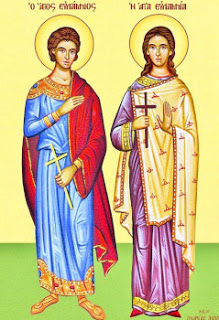
October 10 - Saints Eulampius and Eulampia, Martyrs.
The Holy Martyrs Eulampius and Eulampia, a brother and sister by birth, lived at the beginning of the fourth century in the city of Nicomedia.
Having read the decree of the emperor Maximian (284-305) putting every Christian under a sentence of death by execution, Eulampius became upset that the emperor, rather than going off to fight the enemies of his fatherland, instead was taking up arms against his own subjects.They brought the youth to trial and demanded that he renounce the Christian faith. For his refusal they first tore at him with iron hooks, and then they placed him upon a red-hot bed.
Of a sudden the sufferer expressed a wish to visit the pagan temple. The judges were delighted, supposing that they had swayed the youth from Christianity. In the pagan temple of Mars the saint cried out: "In the Name of the Lord Jesus Christ I command thee, idol dumb and without soul, fall down upon the ground and be turned to dust!" The idol with a crash smashed down upon the ground. People exclaimed: "The Supreme God is the Christian God, great and mighty!" The saint again was taken off for torture.
This time the sister of the sufferer, Eulampia, appeared before the judges and declared that she also was a Christian. Eulampius encouraged his sister: "Sister, fear not those killing the body, but unable to kill the soul" (Mt. 10:28). After tortures they threw the martyrs into a red-hot furnace, but the Lord protected them from the fire. Finally, they beheaded the brother, and the sister died from the tortures.


Books to feed your faith!
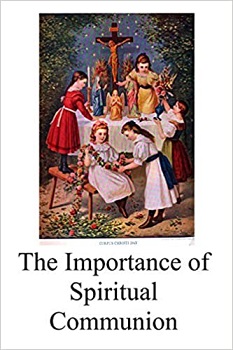
The Importance of Spiritual Communion
Kindle $2.99 / Paperback $5.99
If we cannot receive Holy Communion actually, then let us do so spiritually. These prayers and instructions have been gathered from the Saints and other venerated spiritual writers. Spiritual Communion has been a part of the spiritual life for decades. Growing up I was instructed to make a Spiritual Communion, when I could not go to Communion such as when I assisted at a second Mass. The same is true if one finds oneself at Mass, but not fasting. There are times coming, when it will be difficult, if not impossible to assist at the Holy Sacrifice of the Mass. We should be prepared for such times.
Man's Contract With God in Baptism
$9.95
How often have we been obliged to witness,in the everyday occurrences of human life, scenes which should call forth tears of blood, in beholding the many persons who, after becoming by Baptism the children of God, the members of Jesus Christ and the living temples of the Holy Ghost, yet live as infidels and pagans than as true Christians. In truth, we do not behold men live, as if neither faith nor reason, made any impression upon them, who, wholly occupied with the world and its vanities, seek nothing beyond the gratifications of their own passions, and who, allowing themselves to be entirely carried away by evil, have no more respect for God than pagans ? If these persons perform any act of religion, it is only in compliance with the family routine, or following the habits acquired in early youth, while they are strangers to the spirit of true piety.- From The Book: Man's Contract With God In Baptism by Saint John Eudes
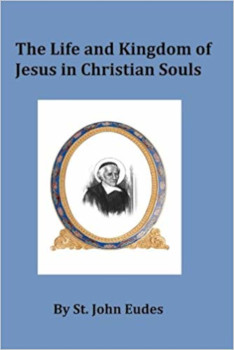
The Life and Kingdom of Jesus in Christian Souls
By St. John Eudes
$17.95
Authored by Saint John Eudes, Introduction by Fulton J Sheen According to the Roman Breviary, Saint John Eudes is the author of devotion to both the Sacred Heart of Jesus and the Immaculate Heart of Mary. His two works on these two devotions are classics. However, he is also a master to the spiritual life; an unknown master. Many are familiar with the works of Saint Bonaventure, Saint Alphonsus Ligouri and Saint Louis de Montfort to name just three of the masters of the spiritual life. And yet, Saint John Eudes has a lot to contribute.
For More Good Traditional Catholic Books:

Crispy Roast Chicken

Ingredients
1 teaspoon kosher salt
1/2 teaspoon caraway seeds
1/2 teaspoon dried sage
1/4 teaspoon fennel seeds
1/4 teaspoon coriander seeds
1/4 teaspoon dried rosemary
2 tablespoons paprika
2 teaspoons garlic powder
2 teaspoons all-purpose flour
1 teaspoon onion powder
5 tablespoons vegetable oil
1 (4 pound) broiler-fryer chicken, cut in half lengthwise
Directions
In a spice grinder or mortar, combine kosher salt, caraway seeds, sage, fennel, coriander, and rosemary. Grind to a coarse powder. Transfer spice mixture to a bowl and stir in paprika, garlic powder, flour, and onion powder; mix in vegetable oil to make a smooth paste.
Pat chicken halves dry with paper towels and tuck wing tips up behind the back. Brush spice paste onto chicken halves, coating both sides, taking care to season under wings and legs. Place chicken halves in baking dish or roasting pan with skin sides up, leaving space around chicken so halves aren't touching.
Roast in preheated oven until a thermometer inserted in a thigh reads 165 degrees F (74 degrees C), about 1 hour. Remove from oven and let rest for 10 minutes before slicing.
Roasted Pumpkin Seeds

1.5 cups raw whole pumpkin seeds
2 teaspoons butter, melted
1 pinch salt
Directions
Preheat oven to 300 degrees F (150 degrees C).
Toss seeds in a bowl with the melted butter and salt. Spread the seeds in a single layer on a baking sheet and bake for about 45 minutes or until golden brown; stir occasionally. Enjoy!
Video sermons and instructions: Timeless timely truths for living the Faith
Christ the King 2010
19th Sunday after Pentecost 2011
18th Sunday after Pentecost 2013
To God Be The Glory
Lamp & Light Bible Study - Matthew 12

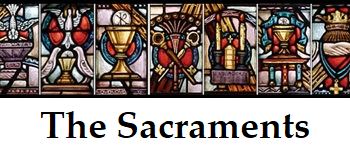
Four people were baptized, confirmed and received their First Holy Communion! "That's 5 this year. Starting at the youngest being 10 and the oldest being in her 80s."
Two priests celebrated the anniversaries of their Ordinations.
The Holy Mass & Sacraments have been brought to the faithful in several states in the U.S.
Please pray for all the members of the Church!

Encouragement for Today
Therefore encourage one another and build one another up.... I Thessalonians 5:11
We believe...
that through our assorted podcasts, audio downloads and devotional blogs, you will find an assorted Treasure Chest of...
Sermons
Devotionals
Scripture Studies
Catechism Lessons
Daily Blogs
...that will be a help in your faithful walk with the Lord.
LEARN MORE AT THE ENCOURAGEMENT FOR TODAY WEBSITE: https://www.encouragementfortoday.com
"Whereby the world that then was, being overflowed with water, perished."
II Peter 3:6
Charles Darwin once wrote of the fossil record, “No organism wholly soft can be preserved.” That’s because evolutionary orthodoxy says that fossils are buried and formed by slow, natural processes. In reality, there are many fossils of soft-bodied animals like jellyfish and squid. That is evidence, of course, of rapid, catastrophic burial at the time of the flood. Darwin rejected the flood and therefore got the science wrong.
It is not unusual to find deep sea creatures in the lowest levels of fossil-bearing rocks. This, too, would make sense in light of the flood. But it is clear that Darwin was wrong again. While living specimens of some of the fossilized squids have now been found, they also have all of the complete features of modern squids. They all have fully functional refracting-lens eyes and the well-known “jet propulsion” of modern squid. One fossilized squid, dated 150 million years old by evolutionists, was so perfectly preserved it looked like it could still have ink. Researchers even reconstituted real ink from its fossilized ink sac. The ink, which looks the same as modern squid ink, was even used to draw a picture of the fossil. There should have been no ink after all that time, so it looks like the Darwinists were wrong on the age, too.
In contrast, God’s Word stands vindicated.
Catechism Catch-Up
The Fourth Commandment: Lesson 11

In our last lesson we have looked at the blessings God promises to those who heed the fourth commandment and we have looked at the judgments He promises to those who do not. We have seen that children have a lifelong duty of honor toward their parents. But while we have learned why we ought to honor our parents, we have not yet considered how. Our question for this lesson is this: How do we show honor to our parents, especially when we are adults?
Honor and Obey
In both descriptions of the Ten Commandments—those found in Exodus and Deuteronomy—, God commands children to “honor your father and your mother.” There is not a word about obedience. Yet when we read the applications of the commandment scattered throughout the scriptures, we see obedience as a key component of the honor children owe their parents. This raises a question: Is obedience to parents permanent or is it temporary? Does honor always require obedience? If I want to honor my parents do I need to continue obeying them throughout my life? To answer these questions we need to examine honor and obedience, looking for what makes them similar and what distinguishes them.
Obey
What the fourth commandment does not require is as important as what it does require. The fourth commandment is not “Obey your father and your mother.” Rather, it is “Honor your father and your mother.” Still, it is clear the Bible places a great deal of emphasis on children obeying parents. We encounter the language of obedience in many of the interpretations and applications of the fourth commandment. Yet as we dig deeper, we find something interesting: the language of obedience tends to come in passages speaking to young children who are still dependent upon their parents. When we come to passages speaking to adult children, we find a subtle switch to language of respect and provision. Thus obedience is a particular form of honor—a form of honor for young children.
"Do it now, do it right, and do it with a happy heart"
All children are to honor their parents at all times. But when children are young, honor most often takes the form of obedience. This is why when Saint Paul interprets the fourth commandment to young children (Ephesians 6:1-3 and Colossians 3:20) he says, “Children, obey your parents.” To obey is to submit to the will of a person who rightfully holds a position of authority, to comply with their demands or their requests. It is, as we teach our children, to “do it now, do it right, and do it with a happy heart.” Obedience is a child’s display of honor.
“Children, obey your parents in the Lord, for this is just. Honour thy father and thy mother, which is the first commandment with a promise: That it may be well with thee, and thou mayest be long lived upon earth.” (Ephesians 6:1-3)
“Children, obey your parents in all things: for this is well pleasing to the Lord.” (Colossians 3:20)
Parents are right to expect and demand obedience of their children and children are right to show honor to their parents through that obedience. It is obedience to parents that trains children to be submissive to every other authority, including God himself. It is under the training and discipline of parents that children are prepared to live orderly lives in this world. Children who respect and obey their parents will build a society that is ordered, harmonious, and productive. A generation of undisciplined, disobedient children will produce a society that is chaotic and destructive.
As it pertains to parents and their young children, obedience is meant to be a temporary measure that lasts as long as children are under the authority of their parents. Childhood is a period of training under the tutelage of parents. Parents force their children to obey so children will learn honor and then spend the rest of their lives honoring parents, teachers, bosses, and governments. A parent’s training in obedience is returned in lifelong honor.
Honor
But what is honor? The Dictionary says, "To revere; to respect; to treat with deference and submission, and perform relative duties to.” Biblically, the word honor refers to weight or significance. To honor our parents we are to attach great worth to them and great value to our relationship with them. The point is that a child must not take his or her parents lightly, or think lightly of them. They must be regarded with great seriousness and value. We can learn what honor looks like by examining the passages that describe the judgments befalling those who dishonor their parents. These are the passages from the civil law and wisdom literature we looked at in our last lesson:
The Jewish Civil Law- “He that curseth his father, or mother, dying let him die: he hath cursed his father, and mother, let his blood be upon him.” (Leviticus 20:9)
Wisdom Literature- “The eye that mocketh at his father, and that despiseth the labour of his mother in bearing him, let the ravens of the brooks pick it out, and the young eagles eat it." (Proverbs 30:17)
What do we find? Children who dishonor their parents are rebellious and stubbornly resistant to the discipline that would lead them out of that rebellion. They may be verbally abusive, mocking and cursing their parents. They may even be physically violent toward them. If we turn to the New Testament we find that their dishonor may take the form of refusing to care for their parents or provide for their physical and monetary needs
Moses said: Honour thy father and thy mother; and He that shall curse father or mother, dying let him die. But you say: If a man shall say to his father or mother, Corban, (which is a gift,) whatsoever is from me, shall profit thee. And further you suffer him not to do any thing for his father or mother, Making void the word of God by your own tradition, which you have given forth. And many other such like things you do. (Mark 7:10-13)
But if any man have not care of his own, and especially of those of his house, he hath denied the faith, and is worse than an infidel. (I Timothy 5:8).
Thus to honor our parents we are to respect and revere them, to speak well of them and to treat them with kindness, gentleness, dignity, and esteem. We are to ensure they are cared for and even to make provision for them when necessary. Honor is an attitude accompanied by actions that say to your parents, ‘You are worthy. You have value. You are the person God sovereignly placed in my life.' All of that and much more is bound up in this little word.
Obey Today, Honor Forever
We need to consider why the basic requirement of the fourth commandment is not obedience but honor. I believe there are at least two reasons: Eventually we are no longer obligated to obey our parents and, even before then, there are times we cannot or must not obey them. To say it another way, there are times we can disobey our parents while still honoring them.
"There comes a time when obeying parents is no longer appropriate."
The end of obedience. There comes a time when obeying parents is no longer appropriate. The task of parents is to raise their children to become independent, to function outside of parental authority. In most cases, the parent-child relationship will be permanently altered at the moment of marriage when “Wherefore a man shall leave father and mother, and shall cleave to his wife:” (Genesis 2:24). As a child becomes independent of his parents he leaves their oversight and authority. He no longer owes obedience in the same way or to the same degree.
The sin of obedience. There may also be occasions when obedience is sinful, such as when parents command their children to sin or when they command their children to disobey God or government. When this happens a child must disobey mom and dad in order to obey a higher authority.
God’s basic command to humanity is not “obey your father and mother” because obedience ends and at times can even be sinful. Instead, God’s command is “honor your father and mother” because honor never ends and is never wrong.
Perfect Honor, Perfect Obedience
We are not without a biblical model of honor and obedience. We see them both perfectly displayed in Jesus. Though he was God, he was born to the Virgin Mary and had Joseph as His Step-Father. He willingly, joyfully, and perfectly honored and obeyed them both. We see his childhood obedience in Luke 2:51 “And he went down with them, and came to Nazareth, and was subject to them.” We see his honor when, in the moments before his death, he ensured provision for his mother: “When Jesus therefore had seen his mother and the disciple standing whom he loved, he saith to his mother: Woman, behold thy son. After that, he saith to the disciple: Behold thy mother. And from that hour, the disciple took her to his own.” (John 19:26-27).
And just as Jesus honored and obeyed his earthly mother and father, he honored and obeyed his heavenly Father. In all he did he spoke well of his Father, he directed glory to him, he carried out his will. And, of course, he obeyed his Father: “Being made in the likeness of men, and in habit found as a man. He humbled himself, becoming obedient unto death, even to the death of the cross.” (Philippians 2:8).
"If we want our children to honor and obey us, we must teach them about Jesus."
Jesus honored and obeyed His parents as well as His heavenly Father. If we want to honor and obey our parents we must learn about Jesus. If we want our children to honor and obey us, we must teach them about Jesus. He, as always, is the example of how to perfectly obey God’s perfect law.
Conclusion
We know there are two great blessings wrapped up in honoring our parents: A long life and a good life. If we dig a little deeper into the New Testament we find there is one more great blessing. “Children, obey your parents in all things: for this is well pleasing to the Lord.” (Colossians 3:20). Our honor makes God pleased. Why? Because in honoring our parents we are honoring the God who gave us our parents. Your honor toward your parents pleases and glorifies God.
READ MORE FROM THE TRADITIONAL CATECHISM AT THE WEBSITE: https://www.traditionalcatechism.com
Living Catholic:
The Principle of Ownership
Keys to understanding irritations and resolving anger and worry
The Biblical principle of ownership involves recognizing that all things ultimately belong to God, that He entrusts us with resources and responsibilities to steward for His glory, and that yielding our personal rights and expectations to Him helps us resolve irritations, anger, and worry.
Recognize That All Belongs to God
As the Creator of all things, God holds the certificate of ownership for the world and all the people in it. (See Psalm 24:1–2.) Christ’s ownership of His entire creation is emphasized in Colossians 1:16–17: “For in him were all things created in heaven and on earth, visible and invisible, whether thrones, or dominations, or principalities, or powers: all things were created by him and in him. And he is before all, and by him all things consist.”
Those who have received salvation through Jesus Christ are “doubly owned” by God, since Jesus purchased their redemption through His death and resurrection. “Or know you not, that your members are the temple of the Holy Ghost, who is in you, whom you have from God; and you are not your own? For you are bought with a great price. Glorify and bear God in your body and in your spirit.” (I Corinthians 6:19–20).
Understand the Responsibilities of Stewardship
God is the Creator and Owner of all things, and along with the good gift of life, He entrusts resources to each person, including time, talents, relationships, and abilities. With every gift of God comes the responsibility to be a faithful steward of those resources.
For example, when granted the gift of family, a husband is responsible to love his wife and a wife is responsible to reverence her husband. Parents are responsible for training their children and caring for their physical, educational, emotional, and spiritual needs. Children are responsible to honor and obey their parents and other elders.
In all things, we are to fulfill our responsibilities for the glory of God. “Therefore, whether you eat or drink, or whatsoever else you do, do all to the glory of God.” (I Corinthians 10:31).
Identify Personal Rights and Expectations
In the areas of life where we have responsibilities, we also have personal rights and privileges—things we believe we deserve. Personal rights affect every facet of life: self, family, friends, knowledge, health, reputation, schedule, future plans, dating, money, clothes, music, activities, possessions, and so on.
Based on these rights, we construct expectations of others and of circumstances. Just because you are alive, you probably believe you have the right to be accepted as an individual, to express opinions, to earn and spend a living, to control your personal belongings, and to make decisions. You expect others to respect your rights and act in a way that fulfills your expectations. Consequently, we often overlook God’s ultimate ownership of all things and begin to take a personal interest in seeing that our rights and expectations are fulfilled. Then, instead of seeing rights and expectations as privileges and blessings that we might or might not receive, we cling to them selfishly.
When we don’t get something we think we deserve, our pride is wounded—anger and worry are our natural responses. Expectations are especially damaging within a family, since people tend to expect more of family members than they do of other people. They also may expect to “get away with” failing to fulfill responsibilities because of the family relationship.
A selfish focus sets us up for conflicts. “Among the proud there are always contentions: . . .” (Proverbs 13:10). We become more concerned about defending our rights and expectations than we are concerned about fulfilling our responsibilities. When offenses arise, the other party may feel justified in his actions, based on expectations of his own that we failed to fulfill—because we were not faithful to our responsibilities.
Yield Rights and Expectations to God
Only as we yield our rights and expectations to God are we free to focus on fulfilling our responsibilities. God is not as interested in giving us what we “deserve” as He is in our recognizing that He is the Owner of all things and that He is able to work all things together for good. He may choose to withhold something you expected to receive in order to help you grow in maturity or to reveal more of Himself to you. By yielding our rights to God, we can respond to life with patience and teachable hearts.
-
Identify Personal Rights
Unresolved conflicts and irritations may indicate rights that need to be relinquished. Focus on areas of life where you have felt angry or worried. Discern your responsibilities in those areas, as well as the rights and expectations that you associate with them. -
Yield Rights to God
Remember that God owns all things. Through the grace and strength God provides for you, embrace the responsibilities that God has entrusted to you, but surrender to God the rights and expectations that accompany your responsibilities. This deliberate surrender of your rights and expectations frees those around you from the prison of your expectations and removes the grounds of many conflicts. -
Transfer Ownership to God
Give your rights and expectations to God. Trust Him to take good care of what belongs to Him. Remember that even if your hopes are not fulfilled, He is always able to work things together for good in your life. -
Thank God for Whatever Happens
In Scripture, we are challenged to thank God in all things. When you surrender your expectations to God, you’ll have a new freedom to rejoice in all circumstances, knowing that God is in charge and that He will take care of you.
Surrendering your rights and expectations to God opens a whole new capacity for gratitude in your life. After all, if someone does something for you that you are expecting, you may not feel obligated to express gratitude. However, if you are not expecting anything, you will be delighted and your gratitude will bless others.
Resolve Anger and Worry
Don’t be surprised if surrendered rights are tested. As you consciously yield your rights to God, let go of your expectations, and learn to focus on your responsibilities instead of what you had expected from others, you might experience a challenging season in your life. Do not fear; God will sustain you, and His grace will be sufficient in your time of need.
When irritations arise, let the negative emotions of anger and worry motivate you to discern if there is an area of life that you haven’t fully relinquished to God’s control. Respond to your irritations with patience, trusting God to work out the situation for your good and for His glory—to develop your character, lead you to new opportunities, and help you mature in Christ.
To Learn More Principles For Life Go To: Resources: Principles of Life


Pray for the Holy Father! Pray with the Holy Father!
- Your prayers are asked this month and every month for the intentions of the Holy Father, Pope Michael.
- Please pray for one of our regular contributors and authors whose computer has just died. May he be back online soon!
- Pray especially that Holy Ghost inspires and helps us prepare spiritual manuals and days of recollection to make available to all.
- Keep in your prayers our Podcast Ministry, a new way to reach out in the missionary work of the Church! We ask for prayers for our other activities world wide. We have made good contacts in the Philippines and Japan and ask prayers that these contacts will bear much fruit for the salvation of souls.
- Be sure to keep St. Helen Catholic Mission in your prayers. Why not go on over to the site now and see what they have to offer and how you might be able to help!
- Also we ask you to keep in prayer our increasing missionary work in the United States and elsewhere.
- Your prayers are asked for Father Francis Dominic as he continues the new work in Kissimmee Florida that has been entrusted to him within the Church.
- Pray for those outside the Church and those who do not know God, that they may see the light of grace and be led safely home to the refuge of the Holy Catholic Church.
- As always, we also ask that you pray for yourself! Never forget your own state of soul. God is calling you to His service in His love. We know that our Lord can count on you to answer.
- We are all praying especially for you, too. May you correspond with every grace of God!
- In what other needs or intentions may we pray for you? Let us know!
- Let us remember that the Church runs on prayer. Without your prayers, God will not work in hearts and souls to bring them to a knowledge of the truth. (I Timothy 2:4)


To Donate online go to:

To Donate by Mail:
Our address is
Vatican in Exile
829 NE Chester
Topeka, Kansas 66616
Make Checks payable to:
Vatican in Exile

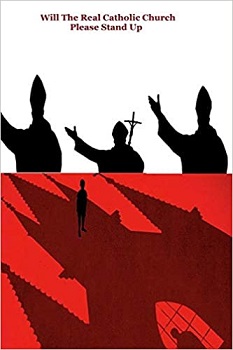
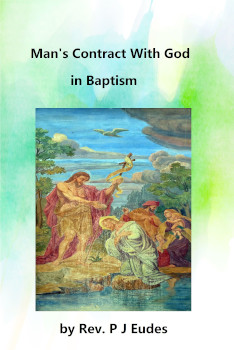











 Follow
Follow


